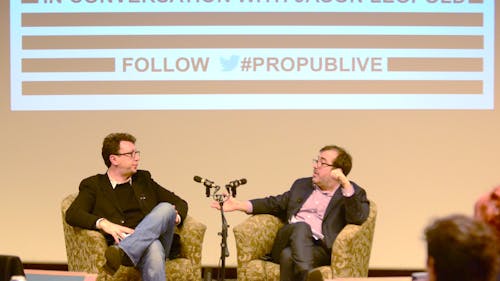Reporter discusses Freedom of Information Act with Rutgers students

In 2011, the U.S. covertly authorized the assassination of an American citizen abroad. Jason Leopold, the journalist that uncovered these details, did so by filing a Freedom of Information Act (FOIA) request.
Monday night, Leopold, a senior investigative reporter for Vice News, took part in a conversation regarding investigative journalism, transparency and FOIA at the Alexander Library on the College Avenue campus.
“The Freedom of Information Act is a law, it’s almost half a century old, and it basically allows the public to petition the government and ask for documents, any documents,” Leopold said. “Some of these documents can be hugely valuable.”
In addition to being valuable, many of the documents attainable by a FOIA request are highly sensitive, Leopold said. The video showing the shooting of Laquan McDonald was released in response to one such request.
McDonald was shot 16 times by members of the Chicago Police Department in October 2014, but the video showing this was not released until November 2015, according to CNN.
In general, FOIA acts as a valuable tool for information gathering. People get information that might not have been readily available, and the information provided is reliable, Leopold said. Prior to 1967, there was no way to acquire such documents.
“The documents speak for themselves — they’re government documents. You’re getting primary source material right there,” he said. “You’re getting to see what (government officials) are saying, what they’re writing, what they’re thinking.”
In addition to providing a wealth of information, these documents can save sizable amounts of time and money on investigations, he said. Verifying information from a source takes significant amounts of legwork.
While the act does allow for a level of transparency within government, the system is not perfect. The government can censor documents through redactions, said Scott Klein, an assistant managing editor at ProPublica, a non-profit newsroom focused on investigative journalism.
“The redactions themselves have rules,” Klein said. “They can’t redact whatever they want. They have to say what the redactions mean and why they’ve been redacted. There are rules that govern redactions.”
While rules exist, a troubling trend has emerged among government agencies responding to FOIA requests, Leopold said.
“There seems to be this great fear that … release of this information will be terribly embarrassing,” Leopold said. “You will get agencies that will ultimately release information. But, they’ll put certain redactions that essentially allow them to black out information only because it is embarrassing.”
Redactions like these are indicative of issues long held in the administration, he said.
“When President Obama was sworn in office in 2009 ... (he) signed an executive order promising to usher in a new era of transparency and open government because of how secretive it was during the Bush era,” he said.
The administration failed in providing the transparency it promised, Leopold said. More than that, turnaround on FOIA requests often took months. Waiting several years for an agency response was not uncommon.
The FOIA process had been politicized to an extent, Leopold said. The Department of Defense keeps a list of all FOIA requests that may garner significant media attention. These requests must be approved before they are released, and often the only response received is a statement saying that the inquiry can neither be confirmed nor denied.
Despite these shortcomings, FOIA is being used throughout the U.S., by citizens as well as investigative journalists, like those working at ProPublica.
ProPublica works to provide the public with information relevant to the public interest, said Eric Umansky, assistant managing editor at the organization.
“Our goal is to hold people ... and institutions accountable for the decisions that they make and the implications of the decisions that they make,” Umansky said.
While the stories published by ProPublica may sway public opinion to one end of the spectrum, the outlet only publishes facts, both Klein and Umansky said.
“We want there to be change. We want to have impact on a particular issue. We want people to be active citizens based on the information that we have provided,” Umansky said. “You could have another perspective on … the information we’re putting out there. We don’t endorse one point or another.”
ProPublica aims to create change, and as such does not pick sides, Klein said.
“Our mission is to have impact on the real world. We want our work to be seen not just by lots and lots of people, but by a specific set of people, people who can really make a difference, whatever that difference is,” Klein said.



